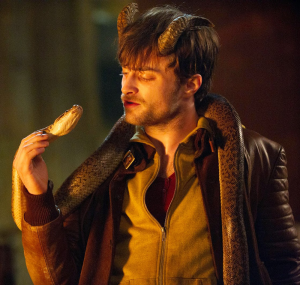
Daniel Radcliffe returns to the big screen in dark thriller “Horns.”
★★★☆☆
Daniel Radcliffe returns to the big screen in the new movie “Horns,” a twisted rendition of Joe Hill’s dark novel from 2010. Packed with symbolic imagery both obvious (Radcliffe does, in fact, start growing a pair of horns) and subtle, the film is an original take on the familiar struggle between good, evil and where humanity falls between the two.
The movie centers on Radcliffe’s character Ig Perrish. Once a happy young man very much in love with his girlfriend Merrin Williams (Juno Temple), he suddenly finds himself hated by his entire town following her abrupt and violent death. To add to this dilemma, he wakes up to find horns spontaneously sprouting from his temples. The horns force other people to confess their deepest sins and act on the darkest of their desires, and Ig uses this bizarre power to learn the truth about his girlfriend’s death and ultimately, about everyone he loves.
Director Alexandre Aja, whose previous work includes the popular films “The Hills Have Eyes” and “Mirrors,” stays true to his horror flick origins in this paranormal thriller. The movie is primarily a black comedy interwoven with elements of the supernatural. This twisted sense of humor is markedly at odds in a film whose themes and imagery are heavily religious and far darker than the occasional jokes seem to imply.
To add to this balance of comedy and gloom are Ig’s frequent flashbacks to when he and Merrin met and fell in love. These scenes are light-hearted and pleasant, a sharp departure from the grim events of Ig’s present day experiences.
Aja dramatizes these events through a disjointed flow that emphasizes how Ig is just as surprised and disturbed as everyone else by what is happening. While the transitions between these scenes and Ig’s present -day scenes are jarring, perhaps even unpleasant, they dramatize how truly devastating it is for Ig to lose someone he loved so dearly and remembers so fondly. The choppiness of the events may cause a bumpy ride for the audience, but it ultimately adds to the film’s portrayal of a young man enduring frightening circumstances.
The sharp contrast may do justice to Ig’s current turmoil, but it misses one important emotion entirely: grief.
Ig is portrayed in the light of anger and humor — very rarely is he ever seen truly grieving for his lost lover. James Remar, who plays Ig’s father, and David Morse, who stars as Merrin’s father, give poignant performances that fill the gaps where Ig’s grief falls decidedly short. Their emotional, heartfelt acting makes up for Ig’s lack of expected sadness despite the horrendous losses and revelations that he endures.
Perhaps the most notable aspect of this movie is its heavy-handed religious tone. Although the movie lacks subtlety in its imagery, this obvious religious undertone still leaves plenty of room for individual interpretation.
From the devilish horns that sprout from Ig’s head to the Cain and Abel dynamic between Ig and his brother, there is an entire dimension of symbolism that can be explored and analyzed. This plethora of meaning saves a movie that would otherwise be classified as a cheap thrill.
“Horns” is a curious amalgam of mystery, romance, horror and fantasy. Radcliffe’s performance touches all these genres — at times, he is a hopeless romantic, and other times, he is the personification of evil. He delivers a strong performance in a rather difficult role that demands a wide spectrum of emotions. While at times, his slightly awkward American accent takes away from his performance, he pulls off the very disjointed elements of his character with tact.
Compared to Radcliffe’s dynamic character, Temple’s Merrin is frustratingly static. Merrin is portrayed as the pretty, coveted girlfriend, and Temple’s portrayal of her seems shallow, and, at times, just downright annoying. There is very little to Ig and Merrin’s relationship other than their constant proclamations of love and the occasional reference to their being together since childhood. This detracts from the believability of their romance and makes viewers less sympathetic toward her character’s unexpected murder.
What “Horns” lacks in emotional depth and subtlety, it makes up for with thoughtful themes and shocking twists. For the most part, its talented cast delivers strong performances in very complex roles. Aja’s nonlinear portrayal of Ig’s past and present are fascinating and confusing, and if you can ignore the crude humor and embrace the overarching religious undertones of the movie, “Horns” can be quite an interesting watch.














